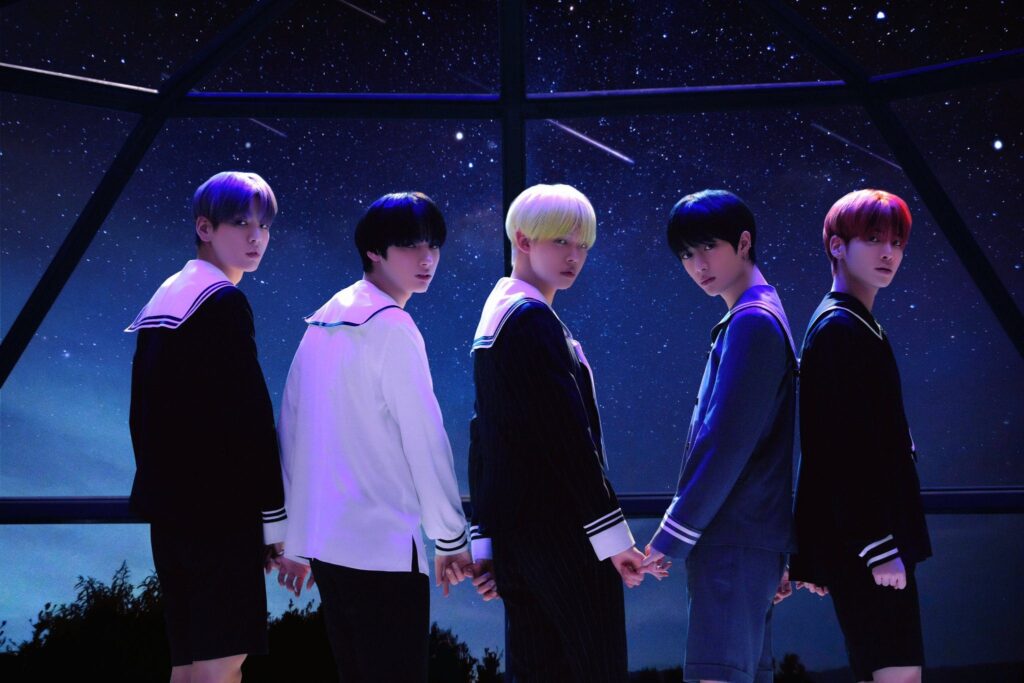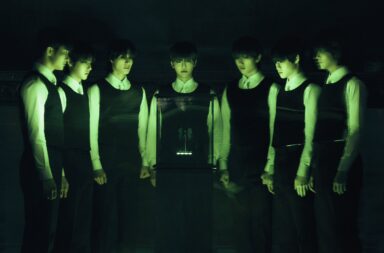
“Endless freefall is evidence of growth,” Beomgyu sings in the opening track to Tomorrow x Together (TXT)’s latest album, The Name Chapter: Freefall. He goes on to observe, “When I woke up, it’s different from the dream that ended.” These lines capture the overall intent of this album, and this stage of TXT’s career.
In their initial The Dream Chapter series, TXT established a signature sound of dreamy, whimsical pop with theatrical and energetic performances. With The Chaos Chapter: Freeze and its repackage The Chaos Chapter: Fight or Escape, the group began to vary their sound, dabbling particularly in emo and pop-punk. In their January 2023 mini-album The Name Chapter: Temptation — which reflected the allure of eternal youth — TXT continued to experiment with genres like afrobeat and bossa nova.
The Name Chapter: Freefall continues TXT’s foray into new genres, particularly rock, represented with “Skipping Stones,” “Blue Spring,” and the opening track “Growing Pain”. With the latter song, the group delves into hard rock for the first time. The 20-second intro, with its grungy guitars and wailing background vocals, immediately creates the impression of “free falling”. The pulsing The song capitalizes on the members’ vocal strengths, from Taehyun’s raspy growls to Beomgyu’s sing-talking baritone. Hueningkai has a number of standout moments, which is perhaps not surprising, as he wrote lyrics along with Taehyun and Yeonjun.
In sharp contrast with “Growing Pain” is the next song, title track “Chasing That Feeling,” a synth-pop song resembling A-ha’s classic “Take On Me.” The retro sound fits the nostalgic, bittersweet vibe that the minor key creates. The song is melodic, groovy, and very catchy, yet is surprisingly restrained for a TXT single. The pre-chorus and chorus build, but do not quite explode in the way the members can deliver. The synth dominates the soundscape; more instrumentation could have made the song fuller. “Chasing That Feeling” is the first title track without the involvement of TXT’s main producer Slow Rabbit— there is drama and an undercurrent of longing in his songs that seems missing here.
With so much variation in genre in the album, the connecting thread among the songs seems to be the “freefall” concept, at least among the B-sides. The Name Chapter: Freefall is full of references to TXT’s past. Even the album’s promotional teaser photos put a twist on those from previous eras — in one example, the members replicate their poses from a concept photo for The Dream Chapter: Eternity. Instead of standing under a glass ceiling, though, they are below an open sky, standing on a rooftop covered in broken glass.
A couple of B-sides allude to TXT’s debut single “Crown,” also known in Korean as “One Day, a Horn Grew from My Head.” “Crown” is a song from the perspective of a speaker who feels awkward or isolated due to his differences, until he encounters someone else with unusual features. Fan song “Blue Spring” confirms that TXT’s fandom MOA were the ones to transform the horn to a crown. “Deep Down,” with the Korean title “The Horn Rising from My Head is My Crown,” delves further in its lyrics. The first verse also refers to the initial “embarrassment” about the horns, but then in the following refrain the speaker comes to a realization:
Endlessly trying to escape
But in the end, I meet myself and the horns
In the pitch-black darkness
Right before I shatter you, I realize
Without you, I am nothing
He understands that the “horns” are part of his identity, and eventually embraces them as “the special one and only given to me.” With the assertion, “Deep down I need you more” in the chorus, the tempo quickens and the accompanying EDM beats feel self-celebratory.

“Dreamer,” on the surface a sensual R&B song, also refers to past songs with Peter Pan references. “Maze in the Mirror,” which Beomgyu wrote about his pre-debut days, conveyed the idea of wanting to be an “eternal Peter Pan” and a “star.” The song “Farewell, Neverland” from The Name Chapter: Temptation continued the Peter Pan motif, but instead said goodbye to this fantasy of perpetual youth.
The first verse of “Dreamer” describes the state of being “beyond Neverland”: “The dreams I loved are difficult.” The members’ breathy upper registers create an ethereal soundscape, illustrating that dreams still have an appeal. Their falsettos sell the sentiment that they are “dreamers with memories of stars.” In fact, they circle back to the title of their era, saying they have “found a name” in being dreamers. An adult cannot live without goals and aspirations either.
This is not to say that aspiring means getting lost in fantasy. “Happily Ever After,” an upbeat mid-tempo track with a drum and bass instrumental, asserts, “Life is not a fairytale.” The song is more playful than angsty about this fact, especially with the most memorable section repeating, “La la la la la I love my days” in high trills. The lyrics reflect liberation that comes with the ability to write one’s own life story.

While The Name Chapter: Freefall implies that the members are creating their own futures, the group also consistently sees others as a lifeline when times are difficult. “Skipping Stones,” an alternative rock song, harnesses the group’s powerful vocals to portray coping with the stresses of reality (as Soobin’s verse describes, “my heart that fluctuates every day”).
In the chorus, the members advise the listener to “throw away the lingering regrets,” like how one skips stones in the water. In this song, the members all contribute to the heartfelt message through their vocal delivery. A highlight is Hueningkai’s soaring high notes in the bridge, assuring listeners that he will “hold your trembling hands.” There is an insistence to Taehyun’s and Yeonjun’s “as always” at the end of the chorus, particularly in Yeonjun’s prolonged vibrato at the end, holding on seconds after the drum and guitar have stopped.
With the fan song “Blue Spring,” TXT also emphasizes they have received support. A pop rock anthem that includes contributions from all members and a production credit for Beomgyu, “Blue Spring” was performed throughout TXT’s last tour. With emotional vocals set over strumming guitar, the members express how the MOA fandom has helped carry them through the “winter” of “endless worries and shaking heartbeat.” Sentimental yet uplifting, the song feels like a fitting end to the arc of the album.
“Blue Spring,” however, is not the final track of the album. “Do It Like That,” TXT’s summer pre-release single in collaboration with the Jonas Brothers, follows “Blue Spring” (along with an English version of “Chasing That Feeling”). “Do It Like That” is a light and fun, but ultimately unnecessary addition to the album. The song may have a functional purpose to draw new (especially Western) fans to the album, but it does not fulfill any thematic purpose, making Freefall feel less cohesive.

“Back for More,” the other pre-release single, suffers a similar problem, though it flows a bit better in the album, with its retro sounds matching “Chasing That Feeling.” The album version of “Back for More” does not feature Brazilian singer Anitta, who was in the official music video and performances. The TXT-only version lacks some funk and flair that she brought to the song, though Hueningkai and Yeonjun’s new verse fits more seamlessly. While a compelling song on its own, especially as a performance piece, “Back for More” mostly serves as a hook into the album rather than a vital element of it.
The Name Chapter: Freefall is at its best with rock and R&B tracks that allow the members to emote in their vocal delivery. While the pop singles from the album seem designed to broaden their appeal to new Western audiences, the B-sides are satisfying for fans who have followed TXT’s evolution. The album seems to reflect an exploratory and transitional stage, experimenting with multiple genres. Yet, due to its strong lyrics and poignant allusions to past work, it is also a rewarding, thematically cohesive cap to the examination of youth throughout TXT’s discography so far.
(YouTube. Lyrics via Genius [1][2][3][4]. Images via BigHit Entertainment).




